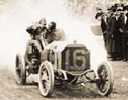Uncensored CΛRT Commentary
by Ed Donath
Floatation Device
6/11/03
ATHENS, NY—"Floating the company was fundamentally an error. Had we not gone public then, I think the
company today would be fine," CΛRT CEO Chris Pook says in a recent SportBusiness International
interview.
Of course, the flip side of that coin displays the image of a huge US currency bonfire; resources that
would not have been available for Grandpa Chris to use today in his role as Series Savior had it not been
for predecessor Andrew Craig’s ability to infuse Championship Auto Racing Teams with copious amounts of
cash, courtesy of outside investors.
"When management took the company public, they took their eye off the ball as far as their core business
was concerned, and started worrying about share price options and all that stuff,” Pook continues.
Here we have yet another half-truth from our sometimes over-glib CEO.
The truthful part of his statement is that former CEO Joseph Heitzler was in it exclusively for his
own personal enrichment. Of course, a twenty-dollar bill for every sentence written about that sad state
of affairs by this renegade scribe would provide a welcome bonanza for the summer race weekend vacation
fund. But that’s a whole ‘nother story.
The homespun part of Pook’s statement is contradicted by the fact that the rest of the previous
management team—the franchise holders—had been lulled into a stupor by Uncle Joe’s con man’s anesthesia.
Primarily, they were guilty of not paying close enough attention to their new jargon-spewing hireling and
to those who, like yours truly, warned from very early on of the danger of his ineptitude and malfeasance.
However, if anything, the team owners were perhaps too deeply involved with their Champ Car racing
“core business.” Their biggest distraction—one that also provided Uncle Joe with a curtain to hide
behind for most of his tenure—was the Spec Rules Unification fiasco. That fire was fueled by other
“core business” lures in the form of Indy 500 sponsor money and preferential treatment by engine manufacturers.
Paul Newman, Carl Haas, Roger Penske, Pat Patrick, Bruce McCaw and Chip Ganassi certainly never spent
a single sleepless night between them worrying about stock options. But other team owners of more modest
means like Derrick Walker, Dale Coyne and the Green Brothers were instantly launched into an entirely
new financial orbit as a result of their ground floor major stockholder windfalls.
While the aforementioned did cash-in most of their chips to enhance the comfort of their lives,
richer and poorer team owners alike continued to chase the necessary cash to keep the “core business”
alive. If things had been better managed before and even during the early days of the Pook regime, our
beloved speed sport might be a stronger and somewhat more solvent entity today.
Furthermore, there is an element of CΛRT going public that no one ever discusses—probably because it
emphasizes the Champ Car Company’s uniquely weird and convoluted corporate persona.
Generally, stockholders’ money is sought for the expansion of private companies. Whether utilized for
research and development or as capital for the acquisition of real property, equipment, or to build an
infrastructure needed to take a company to a higher, more profitable level, most businesses are grown
substantially as a result of public investment.
In CΛRT’s case, however, there was never really a growth plan—except for the growth of franchise
holders’ assets and, ultimately, of the shareholder-ship of one Gerald Forsythe.
Sadly, any spending by new and/or existing investors to re-privatize Championship Auto Racing Teams
is not very likely to grow the series either. Probably, the best outcome that fans of Champ Car racing
can hope for is that future changes will at least serve to keep the boat afloat.
Copyright © 2003 by Ed Donath and Deep Throttle. All Rights Reserved.
Ed Donath Archive
| 



